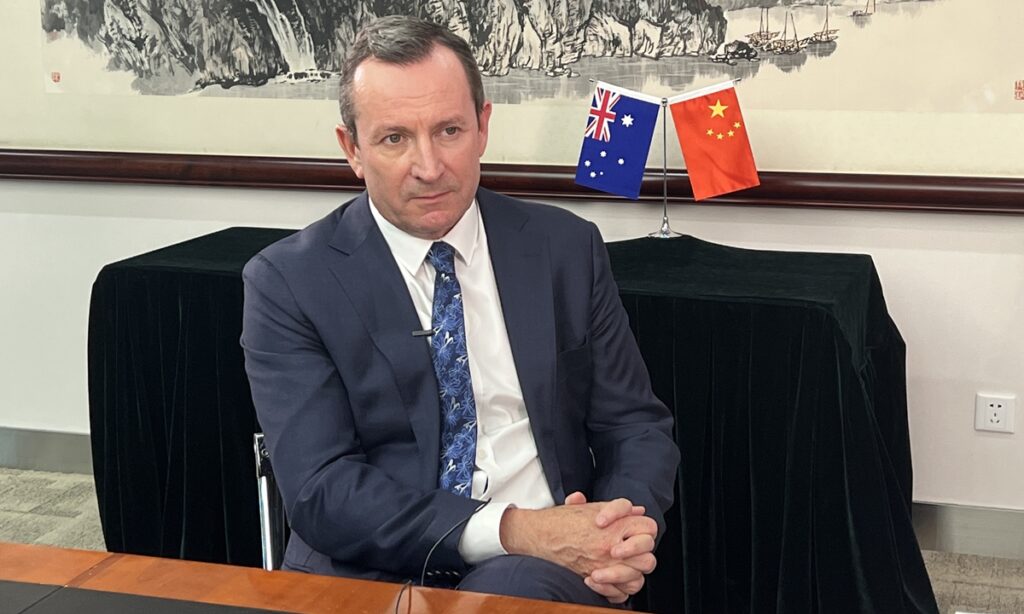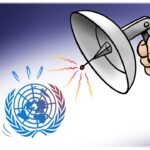Premiers of Australian states have been visiting China in droves amid thawing bilateral relations, eyeing to further deepen trade and economic cooperation with its largest trading partner, while the ongoing visit of Western Australian Premier Mark McGowan being the latest representation despite some voices hyping about “decoupling.”
In an interview with the Global Times on Wednesday, McGowan highlighted a strong and beneficial bilateral relationship, stressing the calls for “decoupling” “are now in the past” and now there is “an appetite for a better relationship with China” after the new federal government took office.
Experts expect a bottom-up push to continue boosting the warming relations while breaking more barriers following stepped-up efforts and engagement from local governments and enterprises in Australia. However, they also noted obstacles remain for the bilateral ties such as the US’ meddling and the so-called AUKUS nuclear submarine pact, and that Canberra needs to drop its hostile approach for a pragmatic one.
Pragmatic calls from states
During McGowan’s five-day trip to China that is the first in nearly four years, the delegation will meet senior Chinese officials such as the officials of the National Development and Reform Commission, China’s top economic planning body, along with businesses and people interested in Western Australia and improving the relationship through various events, McGowan noted.
McGowan expects an outcome with the improvement in relationships and an understanding that investing in Western Australia and having a friendly relationship brings benefits for both countries.
Victoria Premier Daniel Andrews also concluded a four-day visit in March. He told reporters that the state’s relationship with China goes “deeper than just trade,” and that it is a “partnership built on respect, trust and friendship, and one that benefits all Victorians in every sector,” the Xinhua News Agency reported.
Andrews noted that “after more than three years, we’ve met with Chinese leaders in sister provinces that are home to more than 170 million people, sending a message to China that Victoria is a fantastic place for Chinese people to visit and study,” according to Xinhua.
In addition, Queensland’s Premier Annastacia Palaszczuk may visit China in November.
Two-way merchandise trade totaled $58.79 billion in the first quarter of 2023, up 10.9 percent year-on-year, official data showed last week. As for trade between China and Western Australia, the Chinese mainland remains the top trading partner in 2021 to 2022 with A$143.6 billion ($96.19 billion) of goods traded and the largest market for the state’s iron ore, accounting for 80 percent of its total exports during the period, according to official data from Western Australian.
McGowan noted that maintaining close economic and trade ties with China allows for enhanced construction and good agricultural products to be converted into quality food products.
He added that exports for products such as iron ore, gold, gas and other products to China have recovered compared to during the pandemic, while the government is working on restoring the exchange in tourism, airlines and international students.
For instance, the 5th strategic dialogue between China and Western Australia was held on Wednesday, involving senior business representatives from around 30 leading domestic enterprises like Sinoteel and Baosteel to discuss questions the enterprises might have.
Amid China’s economic recovery this year, McGowan emphasized a strong cooperative and economic relationship, while expecting greater cooperation and investment in renewable energies, which can assist both countries’ ambitions to reduce greenhouse gas emissions.
In response to calls from Australia to “decouple from China,” McGowan noted that “I don’t support anyone who says we should decouple. I think the relationship is strong and beneficial to both countries… So in terms of any of those calls, I think they are now in the past.”
He said that it is in everyone’s interest to have a good relationship between Australia and China. “I think with the new federal government in Australia, there is an appetite for a better relationship with China,” he said.
As for some domestic noises seeking to hinder the warming relationship, such as some Australian media which constantly hype the possibility of war with China, McGowan believes that the landscape has improved a lot.
“Obviously, they are dangerous and inflammatory sentiments that those people were promoting. It appears to me that they have largely stopped. So I think it’s improved and I expect it will continue to improve,” he noted.
Australian Foreign Minister Penny Wong recently told the press that “we think it is a good thing that we are engaging,” when responding to a media question about the state leaders’ China trips, Australian media outlet Skynews reported on Monday.
Further efforts needed
Despite some hostile voices and calls to “decouple from China” from some Australian politicians while under the shadow cast by the AUKUS nuclear submarine deal among the US, the UK and Australia, experts noted that local enterprises and governments are actively forging ahead in their relations with China amid lingering uncertainties, indicating their desire for and pragmatism toward a healthy relationship with China.
When Washington is attempting to hold its allies and partners hostage so they continue to act as pawns in the US’ anti-China and containment strategies, local governments and enterprises in Australia have a clearer understanding than some Australian politicians, Chen Hong, president of the Chinese Association of Australian Studies, told the Global Times.
Chen noted that local governments and enterprises in Australia are actively forging ahead in their relations with China and taking the initiative to seek the best interests of their states, territories and enterprises, instead of ignoring their long-term interests and continuing working for Washington’s hegemonic strategy.
For instance, a delegation of about 15 senior representatives of Australian companies and local government officials will make a six-day visit to China, the first of its kind in three years, starting on April 23.
China’s Vice Minister of Agricultural and Rural Affairs Ma Youxiang met with Australian Agricultural Minister Murray Watt along with other government officials during his trip on Monday, aiming to promote bilateral cooperation in agriculture to get it back on a healthy and normal track.
McGowan noted that foreign affairs are a responsibility of the Commonwealth Government, but states have a lot of responsibility for economic, cultural, and social matters, noting that the engagement can assist in laying the ground for the Commonwealth Government which resolves issues at a national level with the Chinese government.
He said he would encourage other state premiers and governments to come to China as well and certainly encourage the Commonwealth Government of Australia to engage in that practice when it comes to enhancing the confidence of the local business community in the marketing environment and economic relations.
While bilateral relations are heading in a positive direction, Chen added that the Australia-US alliance remains the most important cornerstone for Australia’s diplomatic and security strategy, adding that Canberra still faces pressure from the US to “pick a side” while hyping the so-called “China threat.”
Chen called for more efforts for local governments in Australia to strengthen civil exchanges which are particularly critical especially when the federal government is affected by complex international relations factors and the top-down drive is insufficient.
(Global Times)




